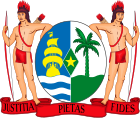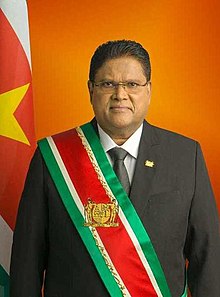President of Suriname
| President of the Republic of Suriname
President van de Republiek Suriname | |
|---|---|
 Standard of the President of Suriname | |
| Style | Mr. President (Informal) His Excellency (Diplomatic) |
| Status | Head of State Head of Government |
| Residence | Presidential Palace of Suriname |
| Seat | Paramaribo |
| Appointer | National Assembly |
| Term length | Five years, renewable |
| Constituting instrument | Constitution of Suriname |
| Precursor | Governor-General of Suriname |
| Inaugural holder | Johan Ferrier |
| Formation | 25 November 1975 |
| Deputy | Vice President of Suriname |
| Salary | 133,560 USD annually[1][2] |
| Website | Cabinet of the President |
 |
|---|
| Constitution |
|
The president of the Republic of Suriname (Dutch: President van de Republiek Suriname) is, in accordance with the Constitution of 1987, the head of state and head of government of Suriname, and commander-in-chief of the Suriname National Army (SNL).
The current president is Chan Santokhi, a former chief of police. He is affiliated with the Progressive Reform Party (VHP). Santokhi was elected on 13 July 2020 as president by acclamation in an uncontested election,[3] and inaugurated on 16 July on the Onafhankelijkheidsplein in Paramaribo in a ceremony without the public presence due to the COVID-19 pandemic.[4][5]
History[]
The office of president was created upon independence from the Netherlands in 1975. Until 1987, the role was largely ceremonial. The first officeholder was Johan Ferrier, a schoolteacher and veteran politician who had served as governor since 1968. He resigned as president in August 1980, several months after a coup d'état. From then until 1988, the titular Presidents were essentially army-installed puppets of Lt. Col. Bouterse, who ruled as a dictator with few practical checks on his power. Democracy was restored in 1988, the year after the adoption of the constitution, in which the duties and responsibilities of the president were included. On 24 December 1990, two days after Bouterse's resignation as army commander, the army called president Ramsewak Shankar to inform him that he and his cabinet were removed from office. Police Chief and Acting Commander of the army, Ivan Graanoogst was appointed Acting President. On 27 December 1990, Johannes Kraag became the president. Since 1991, the president is elected democratically.
Election[]
The president and a vice president are elected by no less than a two-thirds supermajority of members in the National Assembly to a five-year mandate and are accountable to the Assembly. During their time in office, the president must forfeit any additional posts in politics or business.
Qualification[]
A candidate must be a Surinamese national (resident in the country for at least six years) who is at least 30 years of age. A candidate must win at least two-thirds of the votes in the Assembly to be elected. If no candidate wins two-thirds after three rounds, the vote then goes to the United People's Congress, composed of the Assembly and local government officials. In this case, a simple majority is required.
Powers and duties[]
The president is vested with extensive functional powers. The president names and dismisses ministers, signs bills, and names and dismisses diplomatic staff. He declares war and states of emergency with the ratification of the National Assembly. He concludes foreign treaties and agreements, again with the assent of the Assembly. He also exercises ceremonial duties such as conferring awards, receiving foreign diplomats, and granting pardons.
List of presidents[]
- Political parties
- Progressive Reform Party (VHP)
| President | Term of office | Political party | Vice President | ||||
|---|---|---|---|---|---|---|---|
| No. | Portrait | Name (Birth–Death) |
Took office | Left office | Time in office | ||
| 1 | 
|
Johan Ferrier (1910–2010) |
25 November 1975 | 13 August 1980 [a] |
4 years, 262 days | NPS | Position not established |
| 2 | 
|
Henk Chin A Sen (1934–1999) |
15 August 1980 | 4 February 1982 [b] |
1 year, 173 days | PNR | |
| 3 | 
|
Fred Ramdat Misier (1926–2004) |
8 February 1982 | 25 January 1988 | 5 years, 351 days | Independent | |
| 4 | 
|
Ramsewak Shankar (born 1937) |
25 January 1988 | 24 December 1990 [c] |
2 years, 333 days | VHP | Henck Arron |
| 5 | 
|
Johan Kraag (1913–1996) |
29 December 1990 | 16 September 1991 | 261 days | NPS | Jules Wijdenbosch |
| 6 | 
|
Ronald Venetiaan (born 1936) |
16 September 1991 | 15 September 1996 | 4 years, 365 days | NPS | Jules Ajodhia |
| 7 | 
|
Jules Wijdenbosch (born 1942) |
15 September 1996 | 12 August 2000 | 3 years, 332 days | NDP | Pretaap Radhakishun |
| (6) | 
|
Ronald Venetiaan (born 1936) |
12 August 2000 | 12 August 2010 | 10 years | NPS | Jules Ajodhia |
| Ramdien Sardjoe | |||||||
| 8 | 
|
Dési Bouterse (born 1945) |
12 August 2010 | 16 July 2020 | 9 years, 339 days | NDP | Robert Ameerali |
| Ashwin Adhin | |||||||
| 9 | 
|
Chan Santokhi (born 1959) |
16 July 2020 | Incumbent | 1 year, 61 days (as of 15 September 2021) |
VHP | Ronnie Brunswijk |
Timeline[]

Notes[]
- ^ Resigned after the Sergeants' Coup.
- ^ Dismissed by Bouterse.[7][8]
- ^ Deposed in the Telephone Coup.[9]
See also[]
- Suriname
- Lists of Incumbents
References[]
- ^ "Starnieuws - Salaris alle ministers is ruim SRD 15.000 netto". www.starnieuws.com.
- ^ BFMTV. "Qui sont les chefs d'État les mieux rémunérés au monde?". BFMTV.
- ^ "Live blog: Verkiezing president en vicepresident Suriname". De Ware Tijd (in Dutch). Retrieved 13 July 2020.
- ^ "Inauguratie nieuwe president van Suriname op Onafhankelijkheidsplein". Waterkant (in Dutch). Retrieved 13 July 2020.
- ^ "Live blog: Inauguratie president en vicepresident". De Ware Tijd (in Dutch). Retrieved 16 July 2020.
- ^ "Archived copy". Archived from the original on 21 May 2018. Retrieved 20 May 2018.CS1 maint: archived copy as title (link)
- ^ "AROUND THE WORLD; Military in Suriname Takes Over Government". The New York Times. 6 February 1982. Retrieved 15 December 2020.
- ^ "Chin A Sen onder druk afgetreden". Reformatorisch Dagblad via Digibron (in Dutch). 5 February 1982. Retrieved 23 June 2020.
- ^ Howard W. French (27 December 1990). "Suriname Coup Leaders Had Power Already". The New York Times. Retrieved 15 December 2020.
External links[]
- (in Dutch) Kabinet van de President van de Republiek Suriname
- (in English) Constitution of the Republic of Suriname, 1987
- Presidents by country
- Presidents of Suriname
- Lists of political office-holders in Suriname
- 1975 establishments in Suriname



